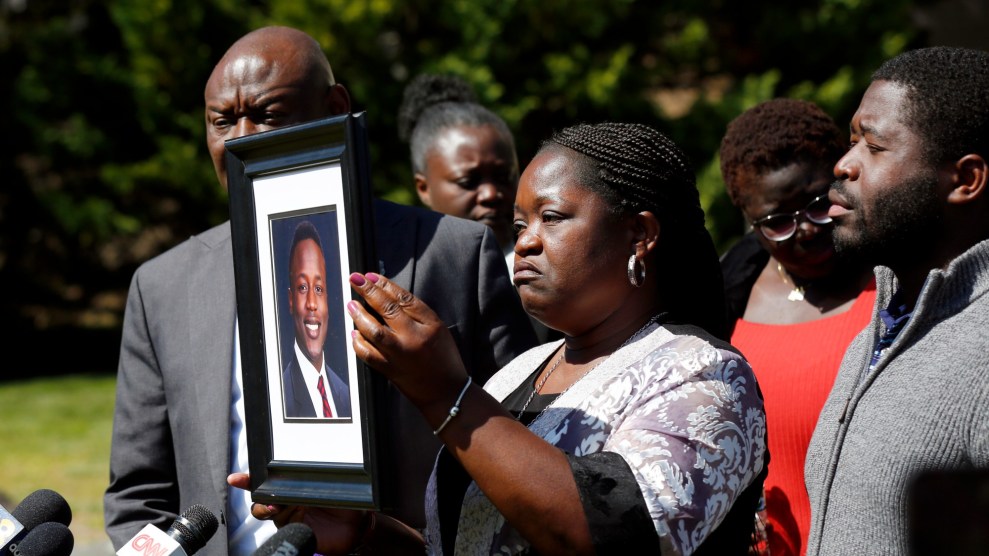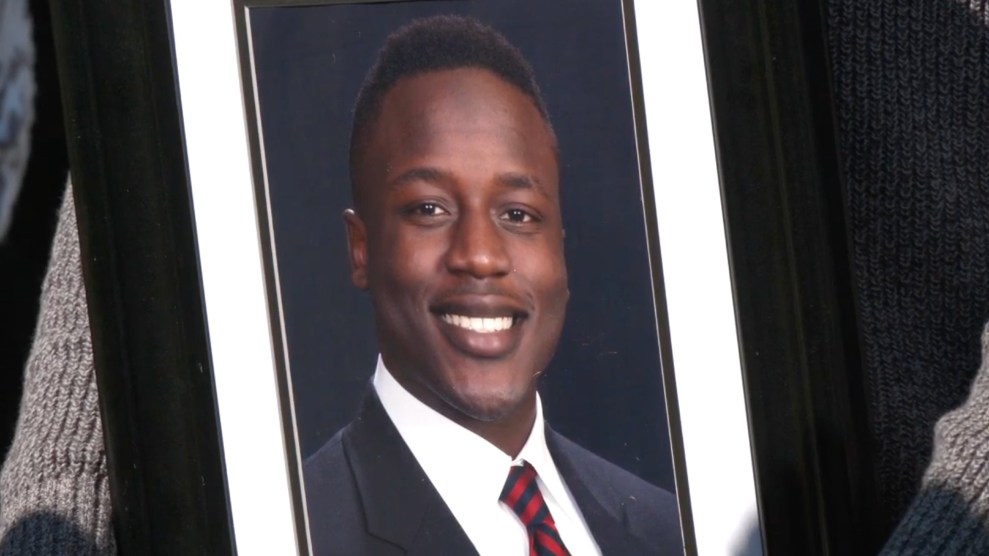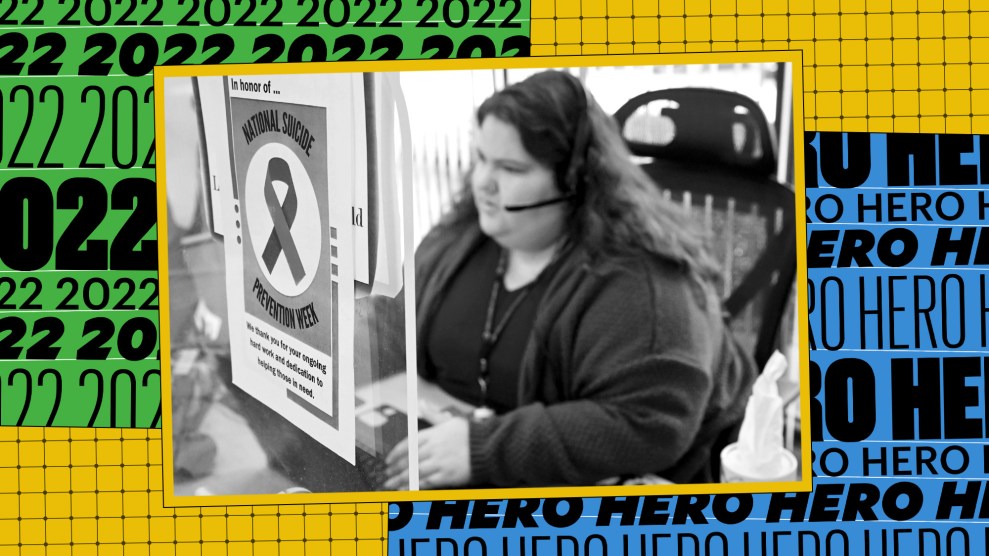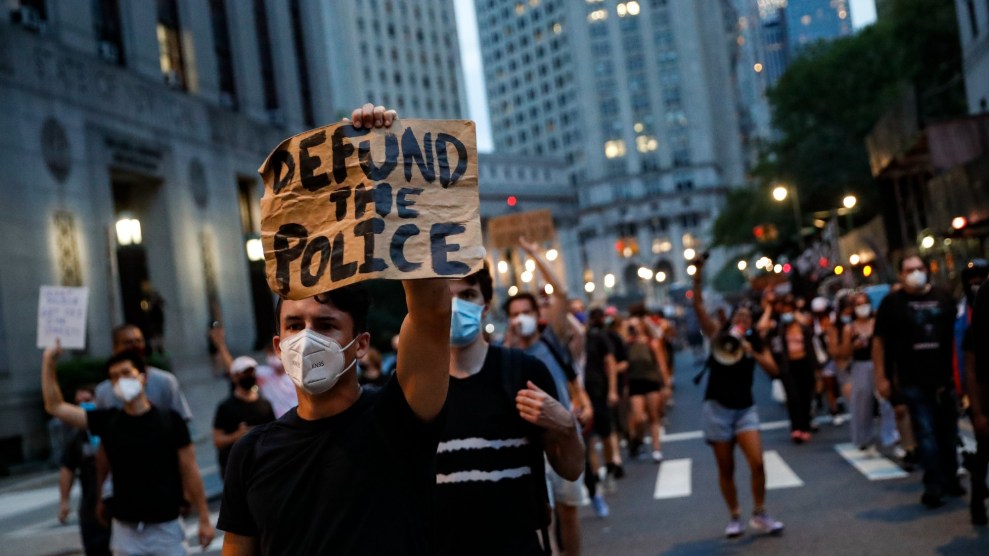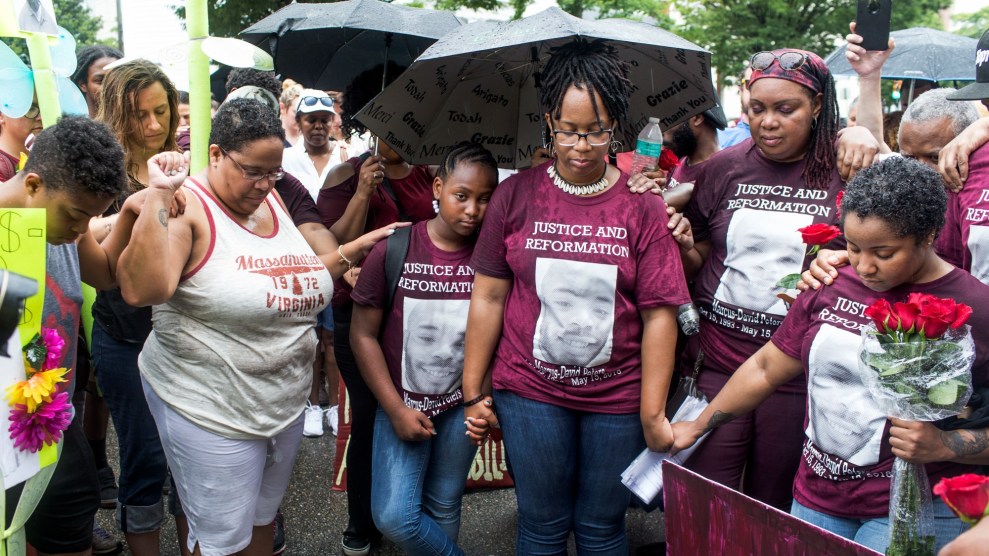
2018 photo of family members, including Princess Blanding.Daniel Sangjib Min/Richmond Times-Dispatch/AP
On March 6, seven Henrico County sheriff’s deputies and three hospital staff members piled on top of 28-year-old Irvo Otieno for nearly 12 minutes before he stopped moving. Security footage from inside the psychiatric hospital where family members say that Otieno had been experiencing a mental health crisis showed him barefoot, with his hands and feet restrained.
The brutal details surrounding Otieno’s final moments before his death have prompted outrage, leading to second-degree murder charges for the ten people involved in Otieno’s death. But for Princess Blanding, a twisted sense of deja vu has greeted the outrage over another Black man dying at the hands of police and Virginia’s broken mental health system. An activist who, in 2020, ran for governor as a third-party candidate, Blanding’s life has been touched twice by the profound tragedy of losing family members to police violence: Two of Blanding’s younger brothers—19-year-old Joshua Mathis and 24-year-old Marcus-David Peters—were killed at the hands of police; both, according to Blanding, had been experiencing mental health emergencies.
“It was absolutely preventable,” Blanding said, referring to Otieno’s death. “He was in a location, at Central State Hospital, where he was supposed to get help. And he ended up getting death.”
“The blood of Mr. Otieno is on the hands of every last one of the legislators in the state of Virginia,” she added.
Virginians may already be familiar with Marcus-David Peters whose May 2018 death by police led to the creation of the Marcus Alert, a system that aims to limit law enforcement’s role in responding to mental health emergencies. But since Otieno’s death, some have questioned the program’s effectiveness and why it has yet to be implemented in most Virginia localities. Data from the alert system has also been exceedingly difficult to find. For Blanding, these questions mirror much of the same concerns she had over the final bill’s version that created the Marcus Alert as it works now.
“Most of the components that were very meaningful and gave the bill the teeth that it needed to be successful, they pulled it out,” she told me. According to Blanding, the family’s original list of proposals, including an end to qualified immunity and the creation of a civilian review board, were ignored.
“We fought tirelessly after my brother, Marcus-David Peters was killed by Richmond police,” said Blanding. “We knew we couldn’t bring him back, so we begged and pleaded with legislators to enact legislation to ensure that having a mental health crisis never resulted in unjust incarceration, brutalization, or death.”
Referring to Otieno’s death, Blanding said, “And it happened anyway.”
Peters’ Death and the Weakening of the Marcus Act
For his family, it had been obvious that Peters, a high school biology teacher, had been suffering from a mental health crisis when he encountered Richmond Police Officer Michael Nyantakyi on May 14, 2018. After all, Peters was naked, unarmed, and creating snow angels on the ground. Soon after his death, Blanding worked with local organizers to demand more community mental health resources and increased accountability for law enforcement. But it wasn’t until the racial justice protests sparked by George Floyd’s death in 2020 that Blanding says Virginia lawmakers started to finally listen. Those efforts to collaborate, however, quickly became frustrating; Blanding tells me she and lawmakers argued over nearly every step of the bill’s development, even when it came to a decision to have the bill named after her brother.
“It was very performative,” Blanding said. “They acted like they cared about pushing this forward. I had to fight to get the bill named after Marcus. I was told that we don’t name bills after people. And I responded, ‘Don’t we have the Amber Alert?'”
As she did at the time of the bill’s signing, Blanding still takes issues with the system’s lack of a unified statewide system for handling behavioral health issues, which leaves it to cities to create their own disparate systems. “That lack of consistency can be the difference between life and death,” she said.
Monica Hutchinson, vice president of the Henrico NAACP, believes the Marcus Alert requires increased triaging between police and Virginia’s mental health hotline, 988.
“We need to ensure that 988 and 911 are working together,” Hutchinson said. “When it comes to triaging the calls, if there’s a low-level call, then we need to make sure that it is a behavioral health mental health specialist that is responding to that call as the primary. Law enforcement can be there as a backup, but they don’t need to be involved.”
This week, as family members and mourners gathered to bury Otieno, similar calls for reform were at the center of remembrances. Rev. Al Sharpton, who gave the eulogy at Wednesday’s service, directly called on Gov. Glenn Youngkin to act. Youngkin, Sharpton insisted amid reports Youngkin is considering a presidential run,
Youngkin has indicated his support for reforms to the state’s mental health system in the wake of Otieno’s death. His latest budget allocates $230 million for behavioral health services, including mobile crisis intervention teams responding to 988 calls. But Blanding has her reservations.
“I’m all for fully funded mental health and behavioral health services. But, let’s do it the right way,” said Blanding. “Let’s do it in a way that the people have input. And the Marcus Alert is something that came from the people for the people.”

